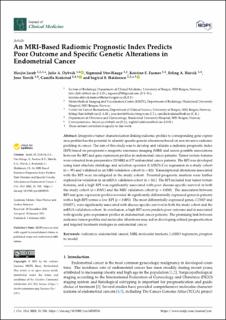| dc.contributor.author | Jacob, Havjin | |
| dc.contributor.author | Dybvik, Julie Andrea | |
| dc.contributor.author | Ytre-Hauge, Sigmund | |
| dc.contributor.author | Fasmer, Kristine E. | |
| dc.contributor.author | Høivik, Erling Andre | |
| dc.contributor.author | Trovik, Jone | |
| dc.contributor.author | Krakstad, Camilla | |
| dc.contributor.author | Haldorsen, Ingfrid S. | |
| dc.date.accessioned | 2021-10-01T12:18:15Z | |
| dc.date.available | 2021-10-01T12:18:15Z | |
| dc.date.created | 2021-09-22T13:08:24Z | |
| dc.date.issued | 2021 | |
| dc.identifier.issn | 2077-0383 | |
| dc.identifier.uri | https://hdl.handle.net/11250/2787023 | |
| dc.description.abstract | Integrative tumor characterization linking radiomic profiles to corresponding gene expression profiles has the potential to identify specific genetic alterations based on non-invasive radiomic profiling in cancer. The aim of this study was to develop and validate a radiomic prognostic index (RPI) based on preoperative magnetic resonance imaging (MRI) and assess possible associations between the RPI and gene expression profiles in endometrial cancer patients. Tumor texture features were extracted from preoperative 2D MRI in 177 endometrial cancer patients. The RPI was developed using least absolute shrinkage and selection operator (LASSO) Cox regression in a study cohort (n = 95) and validated in an MRI validation cohort (n = 82). Transcriptional alterations associated with the RPI were investigated in the study cohort. Potential prognostic markers were further explored for validation in an mRNA validation cohort (n = 161). The RPI included four tumor texture features, and a high RPI was significantly associated with poor disease-specific survival in both the study cohort (p < 0.001) and the MRI validation cohort (p = 0.030). The association between RPI and gene expression profiles revealed 46 significantly differentially expressed genes in patients with a high RPI versus a low RPI (p < 0.001). The most differentially expressed genes, COMP and DMBT1, were significantly associated with disease-specific survival in both the study cohort and the mRNA validation cohort. In conclusion, a high RPI score predicts poor outcome and is associated with specific gene expression profiles in endometrial cancer patients. The promising link between radiomic tumor profiles and molecular alterations may aid in developing refined prognostication and targeted treatment strategies in endometrial cancer. | en_US |
| dc.language.iso | eng | en_US |
| dc.rights | Navngivelse 4.0 Internasjonal | * |
| dc.rights.uri | http://creativecommons.org/licenses/by/4.0/deed.no | * |
| dc.title | An mri-based radiomic prognostic index predicts poor outcome and specific genetic alterations in endometrial cancer | en_US |
| dc.type | Journal article | en_US |
| dc.type | Peer reviewed | en_US |
| dc.description.version | publishedVersion | en_US |
| dc.rights.holder | Copyright 2021 the authors | en_US |
| dc.source.articlenumber | 538 | en_US |
| cristin.ispublished | true | |
| cristin.fulltext | original | |
| cristin.qualitycode | 1 | |
| dc.identifier.doi | 10.3390/jcm10030538 | |
| dc.identifier.cristin | 1937127 | |
| dc.source.journal | Journal of Clinical Medicine | en_US |
| dc.identifier.citation | Journal of Clinical Medicine. 2021, 10 (3), 538. | en_US |
| dc.source.volume | 10 | en_US |
| dc.source.issue | 3 | en_US |

